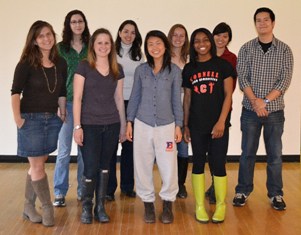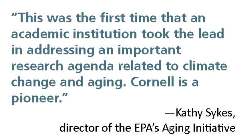By Ted Boscia
Reprinted from the Cornell Chronicle, July 1, 2011.

The federal government is pushing doctors and hospitals to convert to electronic medical records by 2015, touting reductions in costs, increased patient safety and greater efficiencies in the U.S. health care system.
What's largely unknown is how the widespread adoption of computer technology affects the quality of medical care, particularly in nursing homes and other long-term care settings. If nurses and physicians trade pens and charts for handheld devices and laptops, will they lose their personal touch with residents?
Cornell gerontologists, led by Karl Pillemer, the Hazel E. Reed Professor of Human Development in the College of Human Ecology, have produced the first study to examine how nursing home residents perceive electronic health information technology. They also measured its effect on such key health outcomes as the frequency of falls, resident behaviors and performance of everyday tasks.
The findings, published online June 6 in the Journal of Aging and Health, report no negative effects on resident care from electronic health information technology in nursing homes. In fact, residents were generally amenable to new technologies; about three-quarters agreed that "handheld devices help staff to better manage my care."
"Overall, these findings are encouraging for the wider implementation of electronic health information technology in nursing homes," said Pillemer, who is also a professor of gerontology in medicine at Weill Cornell Medical College. "Our primary concern for any new innovation in long-term care, where there are highly vulnerable populations, is whether it harms residents. This study finds no consistent negative effects, with most residents positive about its uses. Therefore, the use of electronic health information technologies in nursing homes would appear to be a net gain for residents."
The Cornell team surveyed 761 residents at 10 long-term care facilities in the New York City area. Five of the facilities had equipped staff with personal digital assistants and laptops for recordkeeping; the others used traditional paper-based charts. They assessed residents twice over a span of nine months to gauge their reactions to the new technologies.
During follow-up resident satisfaction surveys, only about half of the respondents at facilities with computer technologies even noticed the change, suggesting "minimal disruption" to residents, the authors write. Sixty-three percent said their care had stayed the same, with 30 percent rating it as better and 7 percent noting a decline.
"If there are negative outcomes on patients," Pillemer said, "we would expect them to present early on when the new technologies would be most disruptive. That wasn't the case, and it could be that more positives would reveal themselves over time."
Cornell co-authors on the paper, "Effects of Electronic Health Information Technology Implementation on Nursing Home Resident Outcomes," include Rhoda Meador, associate director of outreach and extension for the College of Human Ecology; Charles Henderson, senior research associate, Department of Human Development; Dr. Mark Lachs, professor of medicine and co-chief of the division of geriatrics and gerontology at Weill Cornell; and human development graduate student Emily K. Chen. Jeanne Teresi, director of research at the Hebrew Home for the Aged in the Bronx, is also a co-author.
The study was funded by the New York Quality Care Oversight Committee, which formed in 2006 to produce a demonstration project of the adoption and implementation of health information technologies in a group of unionized, for-profit nursing homes.
Ted Boscia is assistant director of communications for the College of Human Ecology.







